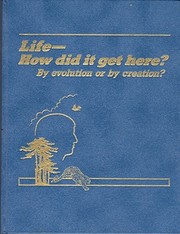

Auf ein Miniaturbild klicken, um zu Google Books zu gelangen.
|
Lädt ... Life — How Did It Get Here? (1985)von Watchtower Bible and Tract Society
 Keine Keine aktuelle Diskussion zu diesem Buch. keine Rezensionen | Rezension hinzufügen
Keine Bibliotheksbeschreibungen gefunden. |
Aktuelle DiskussionenKeineBeliebte Umschlagbilder
 Google Books — Lädt ... Google Books — Lädt ...GenresMelvil Decimal System (DDC)231.7Religions Christian doctrinal theology God; Unity; Trinity Relation to the world - divine law and miraclesKlassifikation der Library of Congress [LCC] (USA)BewertungDurchschnitt: (1.88) (1.88)
Bist das du?Werde ein LibraryThing-Autor. |
|||||||||||||||||||||||||||||||||||||||||||||||||||||||||||||||||||||||||||||||||||||||||||||||||||||||
The 'scientific' part of the book is marked by a lot of quotation: they have plenty of sources. The sources are OK, in the sense that they quote religious sources very little, and thus are not 'self-referential', but still it is a strange mixture of encyclopedias, popular science sources, off-topic and on-topic scientific quotes, some quite out-dated. To exemplify the weird use of sources, they quote Crick, the geneticist, on Big Bang and a little later The New England Journal of Medicine on meteorology.
Generally their strategy is to take a controversial, but still bona-fide scientific theory, like Fred Hoyles panspermia theory or the theories of Dawkins or Stephen Jay Gould, and pit them against more traditional. If A say B is wrong and B say A is wrong, then both of them must be wrong. The same strategy is of course good to use on all later corrections of Darwins original theory.
All in all I can recommend the first 2/3 of the book for people interested in creationist argumentation. It is not preposterous, but slightly pedestrian. Next on my reading list is Daniel Dennetts book on Darwin. (